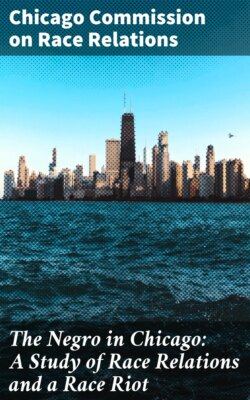Читать книгу The Negro in Chicago: A Study of Race Relations and a Race Riot - Chicago Commission on Race Relations - Страница 4
На сайте Литреса книга снята с продажи.
FOREWORD
ОглавлениеTable of Contents
There is no domestic problem in America which has given thoughtful men more concern than the problem of the relations between the white and the Negro races. In earlier days the colonization of the Negro, as in Liberia, was put forward as a solution. That idea was abandoned long ago. It is now recognized generally that the two races are here in America to stay.
It is also certain that the problem will not be solved by methods of violence. Every race riot, every instance in which men of either race defy legal authority and take the law into their own hands, but postpones the day when the two races shall live together amicably. The law must be maintained and enforced vigorously and completely before any real progress can be made towards better race relations.
Means must be found, therefore, whereby the two races can live together on terms of amity. This will be possible only if the two races are brought to understand each other better. It is believed that such understanding will result in each having a higher degree of respect for the other, and that such respect will form the basis for greatly improved relations between the races.
The Commission on Race Relations, composed of distinguished representatives of both races, has made the most thorough and complete survey of the race situation that I have seen anywhere. While its field of study was necessarily limited to Chicago, the conditions there may be regarded as fairly typical of conditions in other large cities where there is a large colored population.
The report does not pretend to have discovered any new formula by which all race trouble will disappear. The subject is too complex for any such simple solution. It finds certain facts, however, the mere recognition of which will go a long way towards allaying race feeling. It finds that in that portion of Chicago in which colored persons have lived longest and in the largest numbers relatively there has been the minimum of friction. This is a fact of the first importance. For it tends to show that the presence of Negroes in large numbers in our great cities is not a menace in itself.
There is one recommendation (No. 31) to which I desire to call special attention: that a permanent local commission on race relations be created. When as Governor of Illinois I withdrew troops from Chicago after the riots, I was not at all persuaded that all danger of their recurrence was past. I kept observers from the Adjutant General's office on the ground to watch for any signs of fresh trouble. The Commission on Race Relations was appointed, and conditions at once began to improve. The activities of this Commission, composed of the best representatives of both races, were, as I believe, the principal cause for this improved condition.
Causes of friction, insignificant in themselves, but capable of leading to serious results, were discovered by the Commission and by its suggestion were removed in time to avoid grave consequences. Gross exaggerations of some fancied grievance by either the one race or the other were examined into and were found to rest upon nothing else than idle rumor or prejudice. In the light of truth which the Commission was able to throw upon the subject, these grievances disappeared. In other words, misunderstanding, which had been so prolific a source of trouble between the races, was greatly reduced.
The report contains recommendations, which, if acted upon, will make impossible, in my opinion, a repetition of the appalling tragedy which brought disgrace to Chicago in July of 1919.
Men may differ as to some of the conclusions reached, but all fair-minded men must admit, I think, that the report of the Commission on Race Relations is a most important contribution to this important subject.
Frank O. Lowden
